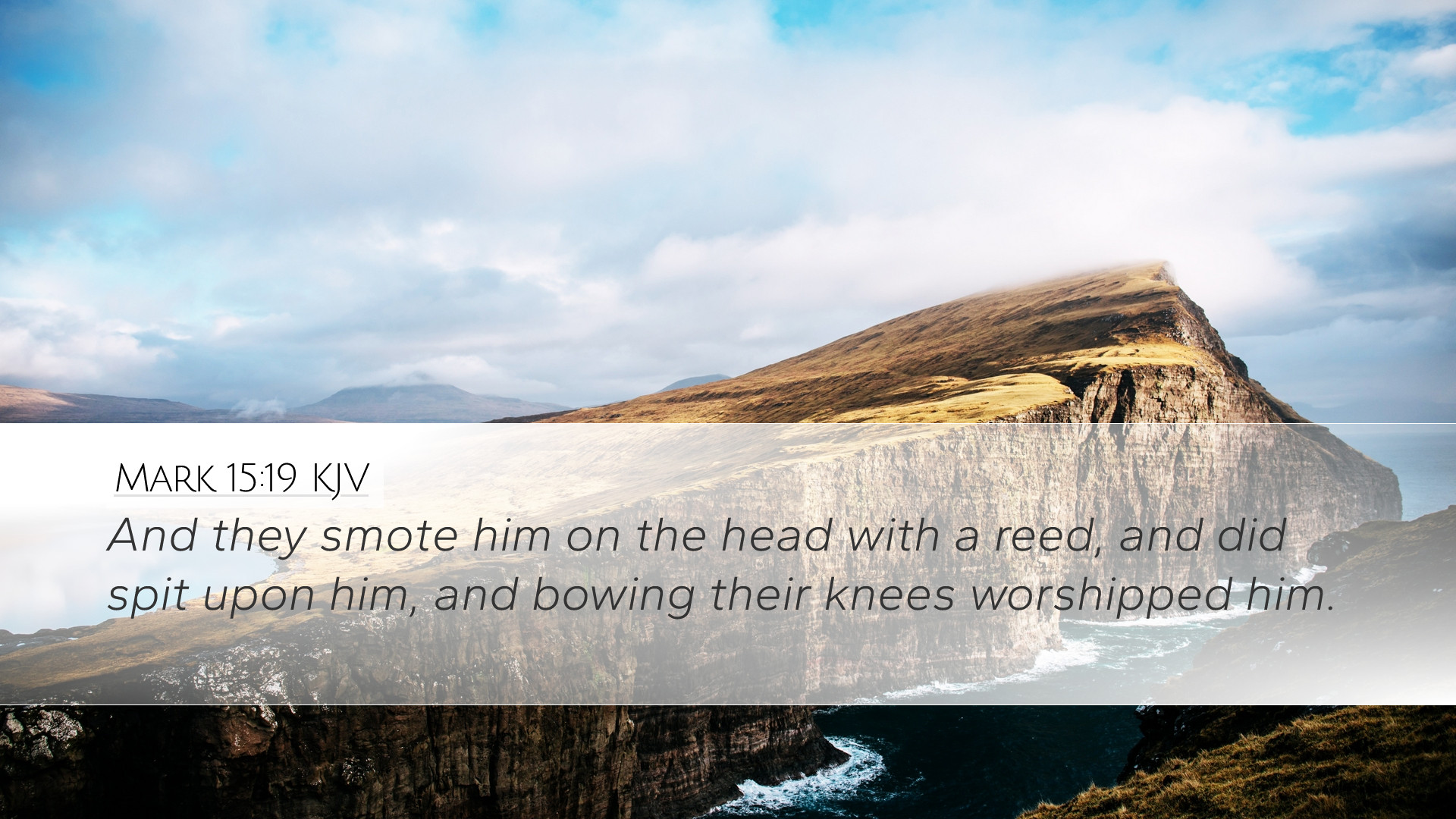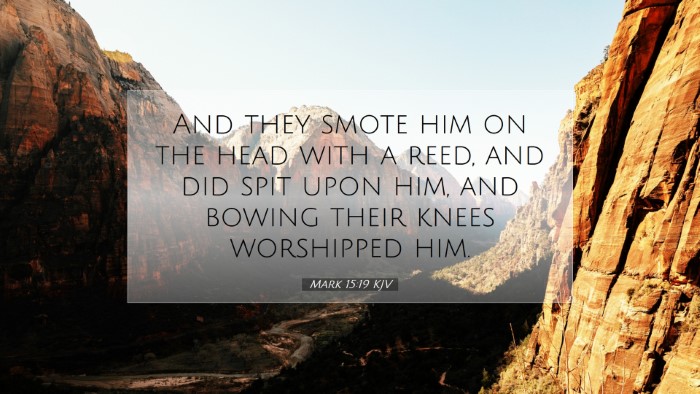Commentary on Mark 15:19
Mark 15:19 states: “And they struck him on the head with a reed and spat on him, and bowing the knee, worshiped him.” This verse appears during the account of Jesus’ trial and subsequent mocking by the Roman soldiers. It provides a stark picture of the humiliation and suffering that Jesus endured prior to His crucifixion.
Contextual Background
The events surrounding Mark 15:19 take place when Jesus is delivered to Pontius Pilate. Here, the soldiers mock Him, fulfilling the prophecies of suffering and rejection outlined in the Old Testament. This moment encapsulates the depths of Jesus’ suffering, not only physically but also emotionally and spiritually.
Insights from Public Domain Commentaries
Matthew Henry's Commentary
Matthew Henry emphasizes the humiliation of Christ evident in this passage. He observes that the mocking of Jesus by the soldiers is a vivid portrayal of the scorn that accompanied His suffering. Henry notes:
“They did all they could to express their contempt of him. They struck him on the head with a reed—affronting his royalty; they spat on him—affronting his holiness; they bowed the knee to him as a mock king—thus manifesting their foolishness and malice.”
Henry further reflects on the irony of their worshipful gesture, stating that despite their disdain, they unintentionally acknowledged His sovereignty. This serves to remind readers of the ultimate authority of Christ, even amidst severe mockery.
Albert Barnes' Notes on the Bible
Albert Barnes elaborates on the significance of the actions taken by the soldiers. He explains that striking Jesus with a reed symbolizes the derision of His kingship. Barnes writes:
“They mocked Him as a pretended king, not believing that He was truly the King of the Jews. This scene of mockery serves not only as a fulfillment of prophecy but as a prelude to His suffering for humanity.”
Barnes focuses on the deeper theological implications of this event, pointing out that this act of mockery underscores the sinfulness of the human heart, which is capable of severe cruelty, especially in rejecting divine truth. The spitting, a vile act of contempt, serves as a metaphor for how society disregards spiritual truth.
Adam Clarke's Commentary
Adam Clarke offers a detailed analysis of the verse, noting that the behavior of the soldiers reveals human depravity. He states:
“These soldiers were the instruments of human authority, yet they acted without conscience, driven by a spirit of cruelty and mockery. Their actions reflect the manner in which the world often treats divine truths and figures, with disdain and ridicule.”
Clarke also connects the mockery to the broader narrative of Jesus’ prophetic mission, highlighting that the physical abuse and humiliation were part of the salvific plan, as Jesus was to be the sacrificial Lamb. He encourages readers to reflect on the gravity of this moment, acknowledging both the pain and the purpose behind it.
Theological Implications
The episode captured in Mark 15:19 invites pastors and theologians to explore the multifaceted nature of Christ’s suffering:
- The fulfillment of prophecy: This passage aligns with Isaiah 53, which speaks of the suffering servant, portraying the depth of Jesus' rejection.
- The contrast between earthly authority and divine power: The actions of the soldiers not only highlight their duty to Roman law but also reveal their ignorance of the true King they ridicule.
- The mockery as a revelation of truth: In their jest, they proclaim His kingship, underscoring Jesus’ role as the Messiah, even while denying it.
Application for Today
Mark 15:19 challenges modern believers to consider how they respond to Christ in their lives:
- Responding to ridicule: In a world where the gospel may face scorn, believers are called to stand firm in their faith, just as Jesus did.
- Recognizing the reality of suffering: The passage encourages an understanding that suffering can be a part of God’s plan, leading to redemptive outcomes.
- Embracing humility: Reflecting on Christ’s humility can inspire leaders and followers alike to serve others without seeking personal glory.
Conclusion
Mark 15:19 is a profound reminiscence of the sorrowful journey of Jesus towards the cross. The insights drawn from the commentaries of Matthew Henry, Albert Barnes, and Adam Clarke encapsulate the depth of suffering, the human condition, and the glorious purpose behind it all. As we consider the implications of this verse, may it lead to a greater understanding of Christ’s sacrificial love and the call for each believer to live in light of that truth.


